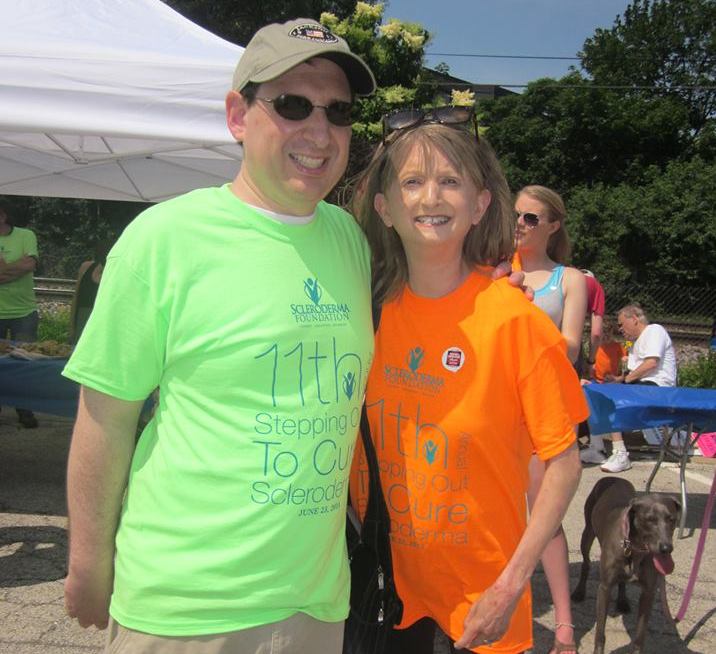8 Ways to Ask (and Not Ask) About Why I Look Different
A friend recently asked me, “Lisa, how do you want people to approach the fact that you look different? What exactly would you like people to do or say when they meet you and are interested in learning about your disease (scleroderma)?” I’ve gotta say, it’s a stumper! Humans are curious creatures. It’s natural and healthy to wonder why people vary from the norm either in appearance or behavior.
I will attempt to answer this tricky question, but before I do, I must first give you a sampling of how I do not want people to approach the topic with me.
1. Blurting out, “What’s wrong with you?” or spontaneously asking, “Why are you sooooo skinny?”
Don’t go up to strangers and ask them personal questions about their appearance. It’s weird when some random patron at the grocery store stares at my splotchy, mangled hands as we examine the produce and says, “What’s wrong with your hands?” This person is not invested in my well-being. Their inquiry is blunt and off-putting. My fantasy response is, “I’m allergic to weird strangers who ask me intrusive questions.”
2. Exclaiming, “Congratulations! Do you know if you’re having a boy or a girl?”
I have super skinny arms and legs but a disproportionally large mid-section. Possible contributing factors are: the aftermath of eight major abdominal surgeries, distention caused by scleroderma, my ostomy bag inflating, or my affinity for donuts and total lack of willpower.
3. Asking, “Are you a witch?”
4. Pretending to not notice I look different when meeting me, but determined not to pursue a friendship with me because I’m weird-looking.
It’s much easier to make a list of what not-to-do than to advise on the best way to handle this delicate situation. Through deep consideration, I devised the following guidelines:
1. Get to know me first.
If you meet someone in a social situation and get to know them as a person, then I think it is perfectly normal to ask them a few questions about his/her altered appearance. I recommend framing your conversation in the context of genuinely wanting to get to know them better.
2. Ease the blow.
It’s best to compliment someone first by saying, “You have gorgeous eyes, but what’s wrong with the rest of your face?” You’ve gotta soften the blow a little.
3. If I give you a clue, take it.
I try to give people overt clues about my disease. This saves us both a lot of awkward dancing. I have a magnet on my car that says “Cure Scleroderma.” When I go swimming, I always wear a Scleroderma Walk tee-shirt over my bathing suit. The silver lining in not being able to wear a cute bikini is that my tee shirts allow me to raise awareness for scleroderma, conceal my purple and red spots, allow people who meet me to immediately know what I have and go home and Google it if they so desire.
4. Emulate this third-grader.
I can think of no better way to describe how to approach me about my appearance than an interaction I had with a third-grader just this past fall. I had been working with this boy in a small group for several weeks. While dismissing the group, we had the following brief interaction:
Third-grader: Mrs. H, you’re beautiful! I mean really really beautiful! Honestly, you’re so beautiful, but I’ve been wondering, why are your wrists sooooo skinny?
Me: That’s a great question and I must tell you I am so impressed with the way you asked it! I know I look different, right? So here’s the deal: I have a problem with my skin that makes it much tighter than most people’s. That’s why my wrists look so skinny. My skin doesn’t stretch as much as it should. Does that make sense?
Third-grader: Yes. Does it hurt?
Me: Sometimes, but I’m really used to it so it doesn’t bother me so much.
Third-grader: Oh. Like I said, you are really really beautiful, Mrs. H.
Mind blown! This third-grader just masterfully steered his way through a complicated question most adults are uncomfortable asking. He followed my prescribed guidelines to perfection:
-He waited several weeks and got to know me before asking me a personal question.
-He expressed interest in my well-being.
I must admit that I still don’t openly discuss my altered appearance with my kiddos. When a child asks, I answer with honesty, but I don’t bring it up. If I were truly fearless, I would ask my district if they would allow me to lead an assembly on “Embracing Our Differences.” I would boldly get up in front of the 600 students in my school and share my experiences in an age-appropriate presentation. I truly believe this would help our kids navigate these difficult issues that many of them face. Most cruel behavior stems from misunderstanding the differences that exist between us.
I would like all you readers out there to weigh in on this. I especially would love to hear from fellow teachers, former students and parents. Please take a moment to make a comment below.

